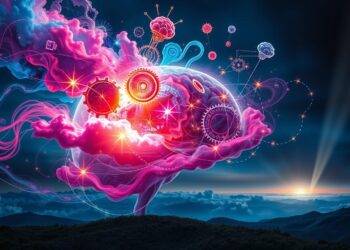“The unconscious is the true psychic reality.” – Sigmund Freud
Sigmund Freud’s theory of the unconscious mind has changed how we see human behavior and personality. He said the unconscious mind holds repressed memories, desires, and impulses. These hidden forces shape our lives, even if we don’t know they exist.
In this guide, we’ll explore Freud’s key ideas. We’ll see how the unconscious mind affects our thoughts, actions, and personality. Get ready to discover the hidden parts of our minds.
Key Takeaways
- Freud’s theory suggests that the unconscious mind stores hidden memories, urges, and conflicts that shape behavior.
- The mind has three levels according to Freud: conscious, preconscious, and unconscious.
- The unconscious mind contains repressed feelings, hidden memories, desires, and automatic reactions.
- Freud believed that much of human behavior is driven by the unconscious, manifesting in dreams, slips of the tongue, and unexplainable behaviors.
- Techniques like dream analysis and free association can be used to access the unconscious mind.
Understanding the Fundamentals of Psychoanalysis
Psychoanalysis was founded by Sigmund Freud. It’s a way to treat mental health issues and a theory on how our minds work. Freud believed that our unconscious thoughts, feelings, and actions are key. His work has greatly influenced psychology, especially in therapy and understanding human behavior.
The Birth of Psychoanalytic Theory
Freud started his psychoanalytic theory by working with patients with hysteria. This condition has physical and mental symptoms. The case of Anna O. helped Freud develop the “talking cure.” He thought talking about problems could help solve them.
This idea led to the psychoanalytic method. It uses free association and dream analysis to explore the unconscious mind.
Key Principles of Freudian Psychology
Freud’s theory is based on several important ideas. These include the unconscious mind, defense mechanisms, and how childhood shapes us. Freud said our behavior comes from two instincts: the life instinct (Eros) and the death instinct (Thanatos). These instincts are always fighting inside us.
The Impact on Modern Psychology
Freud’s ideas still shape modern psychology, especially in psychoanalysis and talk therapy. Some of his theories have been updated or questioned. Yet, his focus on the unconscious mind and early life experiences remains crucial in psychology.

“Consciousness is only a small part of the human mind. The vast realm of the unconscious is the true driver of human thoughts, emotions, and behaviors.”
The Three Levels of Mind According to Freud
Sigmund Freud, a famous psychoanalyst, introduced a groundbreaking theory. He said our minds have three levels: conscious, preconscious, and unconscious. This idea gives us deep insights into how our minds work.
The conscious mind is at the surface. It includes our thoughts, feelings, and what we’re aware of right now. This is the part we actively use and can easily get to.
Underneath the conscious mind is the preconscious mind. It’s like a waiting area where we can easily find information and memories. Freud compared it to the top of an iceberg, visible above the water.
The biggest part is the unconscious mind. It’s like the hidden part of the iceberg. Here, many mental processes, hidden memories, and basic desires live. Freud thought this part drives a lot of our actions, thoughts, and feelings.
“The unconscious is the true psychical reality; in its innermost nature it is as much unknown to us as the reality of the external world, and it is as imperfectly communicated to us by the data of consciousness as is the external world by the indications of our sensory organs.” – Sigmund Freud
Freud’s idea is that our conscious mind is just the tip of the iceberg. Most of our mental life happens in the unconscious. Understanding these levels helps us see into the human mind and why we act and feel the way we do.

By looking into Freud’s theory, we can discover the deep forces that shape us. This knowledge helps us understand ourselves better and deal with life’s complexities.
Exploring the Unconscious Mind Freud Theory
Freud’s idea of the unconscious mind changed how we see human behavior and personality. He said the unconscious holds feelings, thoughts, desires, and memories we’re not aware of. This hidden part of our mind, Freud thought, greatly influences our actions, emotions, and struggles.
Hidden Memories and Repressed Feelings
Freud believed the unconscious mind keeps repressed memories and hidden feelings we can’t face. These repressed memories and feelings can show up in dreams, Freudian slips, and strange behaviors.
The Role of Unconscious Desires
Freud also said the unconscious is driven by unconscious desires. These are impulses and urges we find unacceptable or unpleasant. These hidden desires can affect our thoughts, feelings, and actions, often without us realizing it.
Impact on Behavior and Personality
Freud’s theory shows the unconscious mind is key in shaping our behavior and personality. The battle between our conscious and unconscious can cause conflicts, anxieties, and psychological issues. Freud thought these problems could be solved by exploring the unconscious through dream analysis and free association.
“The unconscious is the true psychic reality; in its inner nature it is as much unknown to us as the reality of the external world, and it is just as imperfectly communicated to us by the data of consciousness as the external world is by the indications of our sensory organs.”
The Structure of Personality: Id, Ego, and Superego
Sigmund Freud’s theory of personality structure is a key to understanding us. It breaks down our personality into three parts: the id, the ego, and the superego. These parts, known as the id ego superego, work together to shape who we are and how we feel.
The id is our most basic part, driven by the pleasure principle. It’s where our basic needs, like sex and aggression, come from. It wants what it wants, right now, without caring about what others think.
The ego is like a middleman between our id and the world. It tries to meet our id‘s needs in a way that’s okay with society. It helps us make smart choices and stay in control.
The superego is our moral compass. It’s shaped by our parents and society. It makes us feel guilty when we don’t act right, pushing us to be good.
Freud said that a balance between these parts is key to being mentally healthy. If they’re out of balance, we might feel anxious, depressed, or act out in bad ways.
Freud’s ideas on personality are still important today. They help us understand ourselves better. By knowing how the id, ego, and superego work together, we can live more harmoniously and happily.
Defense Mechanisms and the Unconscious Mind
Freud’s psychoanalytic theory shows how the unconscious mind affects our actions. Defense mechanisms are key in this theory. They are strategies we use to avoid anxiety and protect our ego.
Common Defense Mechanisms
Freud listed several defense mechanisms. Repression is hiding unpleasant thoughts or feelings. Denial is refusing to see reality. Rationalization is making excuses for our actions. And projection is blaming others for our own feelings.
How Defense Mechanisms Shape Behavior
These mechanisms work without us realizing it. They help us avoid painful feelings. But, relying too much on them can hold us back from growing.
Recognizing Defense Mechanisms in Daily Life
- Notice how you react to tough situations or feedback. Do you tend to downplay, shift blame, or blame others?
- Watch your thoughts closely. Do you often make excuses or justify your actions?
- Think about your feelings. Do you sometimes see your own feelings in others?
Knowing your defense mechanisms is the first step to change. It helps you grow and understand your unconscious mind better.
“The unconscious mind is a powerful force that shapes our behavior, often in ways we don’t fully understand. Recognizing and addressing our defense mechanisms is a crucial step in unlocking our true potential.”
Dream Analysis and Symbol Interpretation
Dive into the world of dream analysis, where Freud’s theory reveals the unconscious mind’s secrets. Dreams are like a window to our deepest desires, fears, and conflicts.
Freud split dreams into manifest content (what we remember) and latent content (the hidden meaning). By studying these symbols, we can understand our unconscious desires that influence us.
Freud thought dreams were a way for our unconscious to express itself. By looking at dream symbols, we can learn a lot about our unconscious mind.
Experts use research to back up Freud’s dream theory. They know dream symbols can be people, objects, situations, or emotions. These symbols mean different things to each person.
Understanding dream symbols needs careful study. Different cultures see the same symbols in different ways. Freud warned against using “dream dictionaries” because they don’t fit everyone’s experiences.
“The interpretation of dreams is the royal road to a knowledge of the unconscious activities of the mind.” – Sigmund Freud
Freud’s book, “The Interpretation of Dreams,” changed how we see dreams. It introduced psychoanalysis. By looking at both the manifest content and latent content of dreams, we can understand ourselves better.
Start your journey of self-discovery with dream analysis. Let Freud’s insights help you uncover your hidden desires, fears, and conflicts. Discover the amazing potential within you.
The Role of Free Association in Accessing the Unconscious
Freud’s theory of the unconscious mind changed psychology a lot. A key part of his work was free association. This method lets people share their thoughts freely, showing how ideas, memories, and feelings are connected.
Techniques of Free Association
In a free association session, people say whatever comes to mind. The therapist listens closely, looking for patterns and hidden meanings. Freud thought this could uncover things people didn’t know about themselves.
Benefits and Limitations
- Gaining Insight: Free association can reveal hidden thoughts and feelings that affect behavior.
- Uncovering Hidden Motivations: It can show what drives people’s actions and choices.
- Potential Resistance: Some might find it hard to open up, fearing vulnerability.
- Risk of Misinterpretation: It’s hard to understand what’s meant because it’s so personal.
Free association is still key in psychoanalytic therapy. It helps people understand themselves better and grow.
| Technique | Description | Potential Benefits | Potential Limitations |
|---|---|---|---|
| Free Association | Patients express thoughts without censorship, revealing unconscious connections between ideas, memories, and emotions. |
|
|
“Free association is the fundamental technical rule of psychoanalysis.”
– Sigmund Freud
Psychosexual Stages and Development
Sigmund Freud’s theory of psychosexual development is fascinating. It shows how our early years shape who we are. Freud says our journey through five stages – oral, anal, phallic, latency, and genital – is key to our adult selves.
Each stage focuses on a different part of our body. From the mouth in the oral stage to the genitals in the phallic stage. Moving through these stages well is vital for a healthy personality. But, if we get stuck, it can affect our future and relationships.
The Oedipus complex is a big part of Freud’s theory. It happens in the phallic stage. It’s when we unconsciously want the opposite-sex parent and feel rivalry with the same-sex parent. This can have big effects if not dealt with right.
Exploring Freud’s psychosexual stages gives us insights into our early experiences. It helps us understand how our early life shapes our adult selves. By knowing these stages, we can appreciate the complex link between our childhood and adulthood.
“The first five years of a child’s life are the most important in shaping their personality and future relationships.”
The Influence of Childhood Experiences on the Unconscious
Sigmund Freud was a key figure in psychology. He showed how childhood shapes our unconscious mind. He believed early traumas and conflicts can hide but still affect us as adults.
Freud divided the mind into the id, ego, and superego. These parts grow from our early years. Each stage, like the oral and phallic, brings its own challenges. If we don’t solve these, they can shape our adult selves.
For example, the oral stage is when babies crave oral comfort. This can lead to habits like overeating as adults. The anal stage is about learning to control oneself. How parents handle this can influence our neatness or messiness.
Freud said that nurturing during these stages is key. He showed how childhood affects our unconscious and adult actions. Studies back him up, saying most of our mental work happens without us knowing.
“Freud’s work remains controversial but influential, extending into various disciplines beyond psychology, reflecting its profound impact on contemporary psychology and other fields such as developmental psychology, social psychology, and neuroscience.”
Knowing how childhood shapes us is vital in psychoanalysis. It helps us find and fix the reasons behind our actions. Exploring our unconscious can lead to growth and healing.
Modern Applications of Freudian Theory in Therapy
Freud’s idea of the unconscious mind is still very important today. Modern psychology has grown, adding new views from neuroscience and cognitive psychology. This helps us understand human behavior and mental health better.
Contemporary Psychoanalytic Approaches
Today, therapists mix Freud’s ideas with other methods like cognitive-behavioral therapy. This makes therapy more complete and effective. Uncovering what’s hidden in our minds is still key in solving psychological problems.
Integration with Other Therapeutic Methods
Freud’s focus on knowing ourselves is still valued in therapy today. Mental health care now sees the need to explore our unconscious. By combining Freud’s ideas with new techniques, therapists can offer more tailored and meaningful help. This helps people deal with the mysteries of their own minds.
FAQ
What is Sigmund Freud’s theory of the unconscious mind?
Sigmund Freud thought that our behavior and personality are shaped by things we’re not aware of. He divided the mind into three parts: conscious, preconscious, and unconscious. The unconscious holds feelings, memories, and desires we can’t see.
What is psychoanalysis and how did it develop?
Psychoanalysis is a way to treat mental health issues and understand the mind. It focuses on the unconscious, defense mechanisms, and early life experiences. Freud used talk therapy, inspired by the case of Anna O., to help people.
What are the three levels of mind according to Freud?
Freud said there are three mind levels: conscious, preconscious, and unconscious. The conscious mind is what we’re aware of. The preconscious is stuff we can easily remember. The unconscious is like an iceberg, holding most of our thoughts and feelings.
How does the unconscious mind influence behavior and personality?
Freud believed the unconscious mind holds repressed memories and desires. These can show up in dreams and unexpected behaviors. He thought that by exploring the unconscious, we could heal from psychological issues.
What are the components of personality according to Freud?
Freud said personality has three parts: id, ego, and superego. The id wants immediate pleasure. The ego deals with reality. The superego is our moral side. These parts work together to shape who we are.
What are defense mechanisms and how do they influence behavior?
Defense mechanisms are ways our mind protects itself from stress. They include things like repression and denial. They help us deal with hard emotions and situations, but can also hide our true feelings.
How does Freud’s theory of dream analysis work?
Freud thought dreams were a way to access the unconscious. He looked at the hidden meanings behind dreams. He believed dreams let us express repressed thoughts and desires in a safe way.
What is the role of free association in accessing the unconscious?
Free association is a technique where people talk freely without stopping. It helps reveal hidden connections and emotions. It’s a key tool in psychoanalysis, but can be challenging to use.
How do Freud’s psychosexual stages influence personality development?
Freud said there are five stages of development: oral, anal, phallic, latency, and genital. Each stage focuses on a different pleasure source. Unresolved issues from these stages can affect our adult lives.
How do childhood experiences shape the unconscious mind?
Freud believed early life experiences shape our unconscious. Traumas and conflicts can be hidden but still influence us. Understanding these early experiences is key in psychoanalysis.
How are Freudian theories applied in modern psychology and therapy?
Freud’s ideas about the unconscious are still important today. Modern psychoanalysis combines Freud’s ideas with new research. Many therapists use Freud’s concepts in their work, helping people understand and deal with their unconscious.




























































